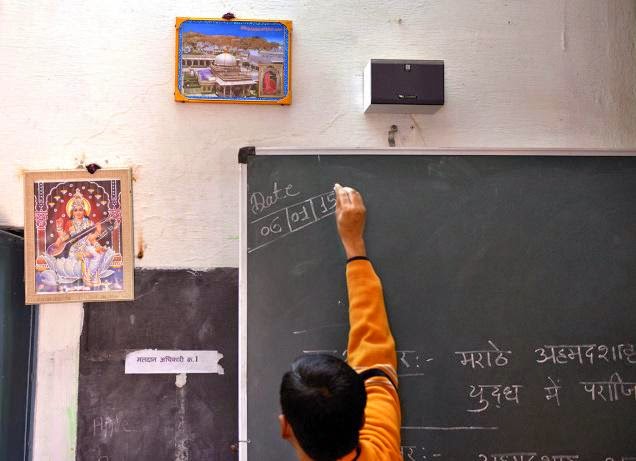Hindu students in Muslim madrasas
 |
| A madrasa in Mandsaur Courtesy The Hindu |
Hindus
and Muslims still live together in India cooperating with each other. Today’s Hindu
newspaper carries a report on the front page with the headline ‘Mandsaur’s
inclusive madrasas.’ Mandsaur is a
district in Madhya Pradesh which has 128 madrasas with a total of 5500 students. In 78 of these madrasas, Hindu students
outnumber their Muslim friends, says the report. 630 of the 865 teachers are Hindus. Images of goddess Saraswati and Ajmer Sharif
coexist in peace and harmony on the walls of the classrooms.
One
must be thankful to The Hindu, I
thought as I read the report, for highlighting such inclusiveness when far too
many Indians are driven crazy by religious fundamentalism. This blog post is my humble attempt to
express my gratitude to the newspaper as much as for celebrating the
inclusiveness. It is also an earnest plea.
One
of the questions I have raised time and again in the classroom as a teacher is
how many of my students have read any of their religious scriptures. The answer has invariably been nil except for
the comic strip versions of the Ramayana and the Mahabharata. Most students (all Hindus) had no idea about
what the Vedas were all about. Quite
many of them had not even the faintest idea about the the Upanishads, let alone
their profundity. Yet some of these
students today are staunch supporters of fundamentalist activities such as Ghar
Vapasi.
Ignorance
is the primary breeding ground of fundamentalism of any sort. Those who understand and internalise religion
will never fight for it. Those for whom
religion is merely a tool for something (political power, social status,
identity source, etc) wield it as precisely that: a tool. It is such people who foment strife and
violence in the name of religion.
Religion
is basically about a set of values and principles. Gods and commandments, canons and rituals are
only tools for helping the believer understand and internalise those values and
principles. Values and principles make
an individual a pro-active person who makes meaningful contributions to the
society. Hatred and violence cannot find
any place in their value system.
The
128 madrasas in Mandsaur should make us sit up and do some serious reflection
and examination of our value system.
Let
me conclude this with an email written in response to my last
post by a friend who is a Catholic priest and a professor of
philosophy.
Dear Tomichan,
This might enlighten
you.
Karl
Rahner, the greatest Catholic theologian of 20th Century, and in many ways,
turned the tide of Critical thinking, through Vatican II and beyond, was
invited to lecture in Japan, on Religion. He had the view of Anonymous
Christian/ity, which meant, in simple terms, that any human being was an
Anonymous Christian, from a Christian's point of view. After the lecture was
over, Suzuki, the Buddhist asked him, " Dr Rahner, if that is the case,
would you mind being called by me, an " Anonymous Buddhist". Rahner
shook hands with him and said, " Why not? Absolutely so."
Karl Rahner and Suzuki
are persons who have internalised their religions. My friend who wrote this letter is also one
such person. And he knows, I believe,
that I am a person who has internalised my atheism.
This post is a plea for
such internalisations. This post is a
plea against ignorance and the strife caused by it.
Let these type of things open the eyes of the blind (fanatics).
ReplyDeleteGood post.
None should extend any type of support to the terrorists.
Terrorism can never be religion.. Nor is fundamentalism. They are perversions. What India is witnessing in the present regime is a blatant political perversion of religion.
DeleteHow lovely this all looks (the pictures on the wall). Can't there be such a peaceful world for real? Why, the heaven is here, after all!
ReplyDeleteIt is possible to have such a world. We will have to throw out all the politicians!
DeleteMeans you want 'Ramayan' without 'Ravan'?
DeleteAbhijit Bangal
Is it really possible, Have you be a peaceful person when life becomes hell?
they are us, blaming other will bring no change.
No, it's not possible. Where 4 or 5 persons gather, there will be politics.
DeleteVery enlightening post
ReplyDeleteThanks, Farah.
DeleteThis should be highlighted so that all come to know about it.
ReplyDeleteSo glad to know about this. :)
I wish our newspapers and the electronic media focused more on this sort of happenings than on the opposite ones.
DeleteIts a really good post and most required in these times where unsavory elements are inciting hatred. we have to worry about the next generation which is growing up in fear.
ReplyDeleteMore than fear, perversion. The next generation is being (has been) perverted by a nexus of politicians and religious leaders.
DeleteTomichan, I am greatly impressed and inspired by your views on sensitive and current burning issues. I just nominated you for Very Inspiring Blogger Award.
ReplyDeleteKeep sharing your insights and inspiring ideas.
http://rekhaaa.wordpress.com/2015/01/12/1338/ :)
Obliged for the great honour, Rekha. I'm mighty pleased that you took much trouble to make sure that I do get this award :)
DeleteBeautifully written Sir! So very much agree wih . Am also thankful to Hindu newspaper for this article. Wish everyone could be so embracing of all religions. Why dnt ppl see others as people first??
ReplyDeleteYes, Amrita, if the media changes its focus from hatred to love, cruelty to compassion, and the leaders change their strategies... we can have a better world. People are not necessarily evil, I think.
DeleteInternalization of beliefs. What a great thought is this!
ReplyDeleteIt's nothing new, Namrata. A few decades back the eminent educationist Benjamin Bloom spoke about the necessity of internalising values in school. I borrowed the concept from him, in fact.
DeleteThis comment has been removed by a blog administrator.
ReplyDelete